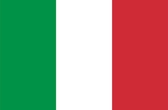
Call 0330 880 3600 Calls may be monitored or recorded. Opening Times.
- TRAVEL INSURANCE
- COVID-19 COVER
- More Options
- Help & Advice
- Existing Customers

Call 0330 880 3600 Calls may be monitored or recorded. Opening Times.

Need help?
UK Customer Services0330 880 3600*
Open Monday to Friday 9:00am to 6pm, Saturday 8:30am to 4pm and closed Sundays.
*Calls are recorded for training and quality purposes.

Official name: Italian Republic
Capital city: Rome
Languages spoken: Italian
Population: Around 59 million
Currency: Euro (EUR)
Time zone: GMT+1
Driving side: Right
Climate: Mediterranean overall, with hot summers in the south and milder, wetter conditions in the north
Italy enchants visitors with its rich history, world-famous cuisine, and breathtaking scenery. From the ruins of Rome and the art treasures of Florence to the canals of Venice and the rolling hills of Tuscany, there’s something for every traveller. The south offers sun-drenched beaches and volcanic landscapes, while the north boasts alpine peaks and ski resorts. Beyond the headline attractions, small villages and coastal towns offer authentic glimpses of Italian life.
Italy is a long, boot-shaped peninsula extending into the Mediterranean Sea, with the Alps to the north and islands such as Sicily and Sardinia in the south. Its landscapes range from mountains and lakes to vineyards, olive groves, and dramatic coastlines. The variety of terrain is one of Italy’s biggest appeals, making it as ideal for hiking and skiing as it is for beach holidays.
Italy has a well-connected transport network, with international airports in Rome, Milan, Venice, and Naples. High-speed trains link major cities, while regional trains and buses cover smaller towns. Driving is a popular option for exploring rural areas, though traffic in big cities can be hectic and parking scarce. Ferries connect the mainland with islands like Sicily, Sardinia, and Capri.
As an EU and Schengen member, Italy allows UK citizens and many other nationals to visit visa-free for up to 90 days within a 180-day period. Longer stays, or those for work and study, require the appropriate visa. The British Embassy is located in Rome, with additional consulates in Milan, Florence, and Naples.
Italy uses the euro (EUR). ATMs are widely available, and cards are accepted almost everywhere, although small businesses may prefer cash. Italy is moderately priced by Western European standards, though costs can be higher in tourist hotspots. Tipping is not obligatory but leaving small change or rounding up is appreciated.
Italy has a modern healthcare system, with hospitals and clinics across the country. EU residents can use an EHIC/GHIC card for access to state-provided healthcare, but travel insurance is recommended for private treatment or unexpected costs. Pharmacies (farmacie) are easy to find, and staff are usually knowledgeable. Tap water is safe to drink, though many Italians prefer bottled water.